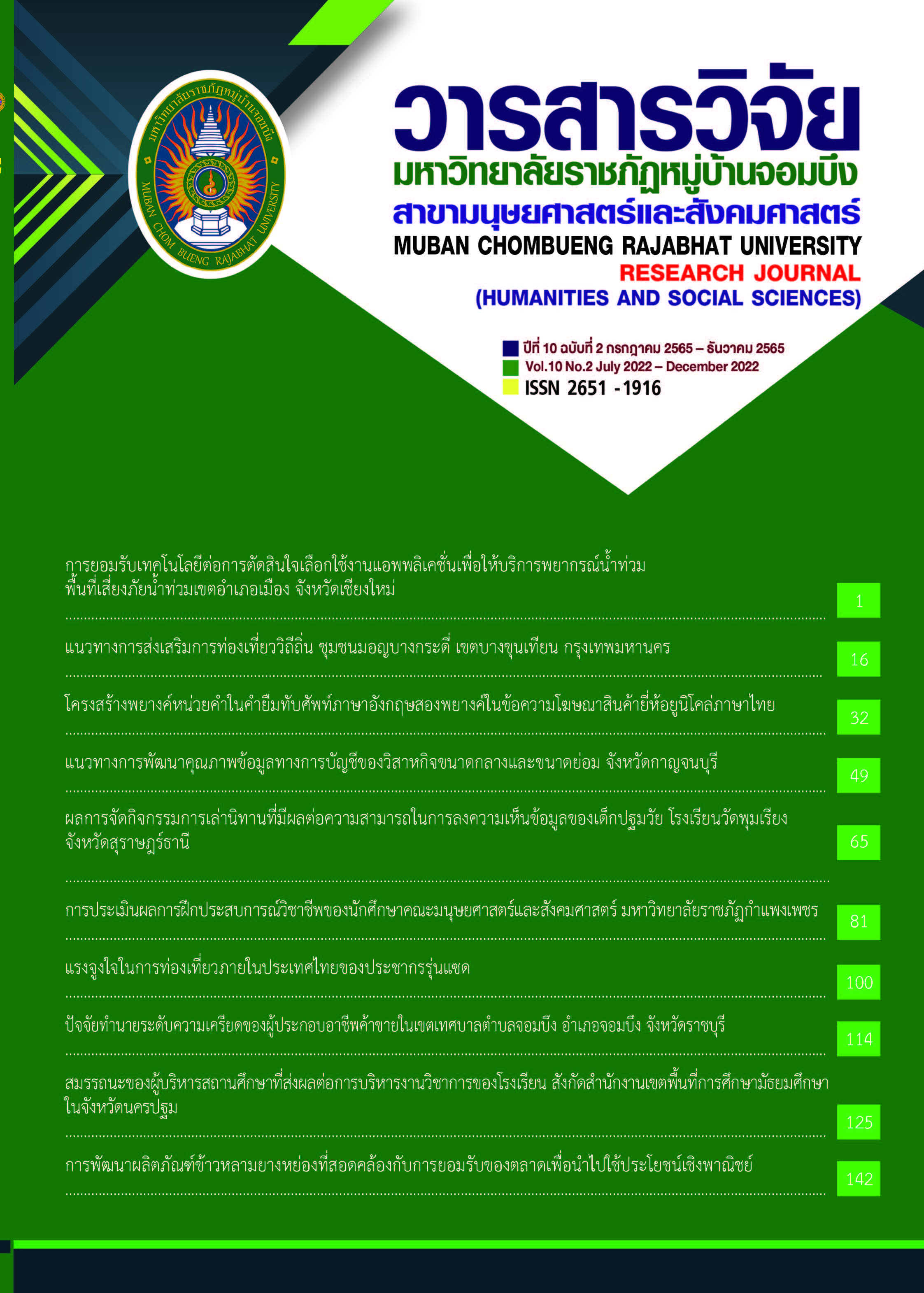แรงจูงใจในการท่องเที่ยวภายในประเทศไทยของประชากรรุ่นแซด
คำสำคัญ:
แรงจูงใจในการท่องเที่ยว, การท่องเที่ยวภายในประเทศ, ประชากรรุ่นแซดบทคัดย่อ
การวิจัยนี้มีวัตถุประสงค์เพื่อ 1) ศึกษาระดับแรงจูงใจในการท่องเที่ยวภายในประเทศไทยของประชากรรุ่นแซด และ 2) เปรียบเทียบแรงจูงใจในการท่องเที่ยวภายในประเทศไทยของประชากรรุ่นแซดกับปัจจัยทางชีวสังคม เลือกตัวอย่างแบบหลายขั้นตอนพร้อมทั้งเก็บข้อมูลด้วยแบบสอบถามจากประชากรรุ่นแซด จำนวน 1,047 คน การวิเคราะห์ข้อมูลใช้การแจกแจงความถี่ ร้อยละ ค่าเฉลี่ย ส่วนเบี่ยงเบนมาตรฐาน ค่าสถิติทดสอบทีที่เป็นอิสระต่อกัน และการวิเคราะห์ความแปรปรวนหนึ่งทาง
ผลการวิจัย พบว่า 1) ประชากรรุ่นแซดมีแรงจูงใจในการท่องเที่ยวภายในประเทศไทยระดับค่อนข้างสูง และ 2) ประชากรรุ่นแซดที่มีอาชีพและรายได้ของครอบครัวเฉลี่ยต่อเดือนแตกต่างกันมีแรงจูงใจในการท่องเที่ยวภายในประเทศไทยแตกต่างกันอย่างมีนัยสำคัญทางสถิติที่ระดับ 0.05
เอกสารอ้างอิง
ข่าวสด. (2563). เปิดกลยุทธ์ท่องเที่ยวไทย รุกหนักปี 2564-หวังฟื้นคืน. สืบค้นเมื่อวันที่ 2 มกราคม 2564, จาก https://www.khaosod.co.th/economics/news_5221509.
จุฑารัตน์ เพ็ชรประคอง, ฐิติมา มากศรี, ชญานิษฐ์ จารุพันธ์, รัชดาภรณ์ เหล้นเฉื้อง, อรัญญา วงศ์พุฒ และอรจันทร์ ศิริโชติ. (2561). แรงจูงใจของนักท่องเที่ยวที่มาเที่ยวในอำเภอเมือง จังหวัดสงขลา. วารสารปาริชาต มหาวิทยาลัยทักษิณ, 31(3), 178-184.
ชัยวัฒน์ เกตุสิทธิบูล. (2547). แรงจูงใจในการท่องเที่ยวในประเทศของผู้ที่พำนักอยู่ในเขตกรุงเทพฯ และปริมณฑล. วิทยานิพนธ์ศิลปศาสตรมหาบัณฑิต, มหาวิทยาลัยศรีปทุม. กรุงเทพฯ.
นำชัย ชีววิวรรธน์. (2563). COVID-19 โรคระบาดแห่งศตวรรษ. กรุงเทพฯ: มติชน.
ธรา สุขคีรี. และเลิศพร ภาระสกุล. (2559). แรงจูงใจและทัศนคติของนักท่องเที่ยวชาวไทยต่อคุณลักษณะด้านสภาพแวดล้อมและการจัดการการท่องเที่ยวในอุทยานประวัติศาสตร์พิมาย อำเภอพิมาย จังหวัดนครราชสีมา. วารสารวิชาการบัณฑิตวิทยาลัย มหาวิทยาลัยสวนดุสิต, 12(3), 233-248.
วลัยพร ริ้วตระกูลไพบูลย์. (2557). พฤติกรรมนักท่องเที่ยว. (พิมพ์ครั้งที่ 5). ปทุมธานี: มหาวิทยาลัยกรุงเทพ.
ศิวพร มีนาภา. (2562). ปัจจัยแรงจูงใจในการท่องเที่ยวและปัจจัยองค์ประกอบของแหล่งท่องเที่ยวที่ส่งผลต่อพฤติกรรมการท่องเที่ยวของนักท่องเที่ยวชาวไทยที่เดินทางมาท่องเที่ยวในจังหวัดพระนครศรีอยุธยา. วิทยานิพนธ์ศิลปศาสตรมหาบัณฑิต, มหาวิทยาลัยกรุงเทพ. กรุงเทพฯ.
ศูนย์ข้อมูลกรุงเทพมหานคร. (2558). รูปแบบการบริหารกรุงเทพมหานคร. สืบค้นเมื่อวันที่ 12 มกราคม 2564, จาก http://203.155.220.230/m.info/bma_k/knw5.html
ศูนย์วิจัยกสิกรไทย. (2563). ตลาดไทยเที่ยวไทยช่วงโค้งสุดท้ายของปี 2563 ... คนไทยมีแผนท่องเที่ยว แต่กังวลโควิด เศรษฐกิจ และการเมือง (กระแสทรรศน์ ฉบับที่ 3152). สืบค้นเมื่อวันที่ 2 มกราคม 2564, จาก https://kasikornresearch.com/TH/analysis/k-econ/business/Pages/z3152--Thai-Travel.aspx.
สำนักงานคณะกรรมการการพัฒนาการเศรษฐกิจและสังคมแห่งชาติ. (2556). การคาดประมาณประชากรของประเทศไทย พ.ศ. 2553 – 2583. กรุงเทพฯ: สำนักงานคณะกรรมการการพัฒนาการเศรษฐกิจและสังคมแห่งชาติ.
Auliya, Z. & Pertiwi, Imanda. (2020). The influence of electronic word of mouth (E-WOM) and travel motivation toward the interest in visiting Lombok, gender as a mediator. INFERENSI: Jurnal Penelitian Sosial Keagamaan, 13, 201-218.
Christina, K., Leonidas, H., Thomas, F. & Folinas, D. (2020). Push and pull travel motivation: Segmentation of the Greek market for social media marketing in tourism. Sustainability, 12(11), 4770-4787.
Cronbach, L. J. (1990). Essential of psychological testing. New York: Harper & Row.
Dlomo, N. C. & Ezeuduji, I. O. (2020). Local residents’ assessment of South Africa as a domestic leisure travel destination. African Journal of Hospitality, Tourism and Leisure, 9(3), 335-348.
Faul, F., Erdfelder, E., Buchner, A. & Lang, A. G. (2009). Statistical power analyses using G*Power 3.1: Tests for correlation and regression analyses. Behavior research methods, 41(4), 1149-1160.
Gardiner, S., Grace, D. & King, C. (2014). The generation effect: The future of domestic tourism in Australia. Journal of Travel Research, 53(6), 705-720.
Kalmár-Rimóczi, C. (2019). Touristic motivation and lifestyles of Hungarian domestic tourists correlation study. Applied Studies in Agribusiness and Commerce, 13(1-2), 47-54.
Kifworo, C., Okello, M. M. & Cheloti-Mapelu, I. (2020). Demographic Profiling and Domestic Tourism Participation Behavior in Nairobi County, Kenya. Journal of Tourism Management Research, 7(2), 155-169.
Krishnapillai, G. & Kwok, S. Y. (2020). Uncovering the muslim leisure tourists’ motivation to travel domestically - Do gender and generation matters?. Tourism and Hospitality Management, 26(1), 213-231.
Lwoga, N. & Maturo, E. (2020). Motivation-based segmentation of rural tourism market in African villages. Development Southern Africa, 37(5), 773-790.
Morupisi, P. & Mokgalo, L. (2017). Domestic tourism challenges in Botswana: A stakeholders' perspective. Cogent Social Sciences, 3(1), 1-12.
Peng, J., Xiao, H., Wang, J. & Zhang, J. (2020). Impact of severe smog on travel demand of residents in tourist generating places: A case study of Beijing. Current Issues in Tourism, 23(16), 2009-2026.
Prayag, G., Suntikul, W. & Agyeiwaah, E. (2018). Domestic tourists to Elmina Castle, Ghana: motivation, tourism impacts, place attachment, and satisfaction, Journal of Sustainable Tourism, 26(12), 1-18.
Schroer, W. J. (2015). Generations X,Y, Z and the others. Retrieved on December 25, 2020, from: http://www.socialmarketing.org/newsletter/features/generation2.htm.
Slivar, I., Aleric, D., & Dolenec, S. (2019). Leisure travel behavior of generation Y & Z at the destination and post-purchase. E-Journal of Tourism, 6(2), 147-159.
Wachyuni, S., & Kusumaningrum, D. (2020). The effect of COVID-19 pandemic: How are the future tourist behavior?. Journal of Education, Society and Behavioural Science, 33(4), 67-76.
ดาวน์โหลด
เผยแพร่แล้ว
รูปแบบการอ้างอิง
ฉบับ
ประเภทบทความ
สัญญาอนุญาต
ลิขสิทธิ์ (c) 2022 วารสารวิจัยมหาวิทยาลัยราชภัฏหมู่บ้านจอมบึง สาขามนุษยศาสตร์และสังคมศาสตร์

อนุญาตภายใต้เงื่อนไข Creative Commons Attribution-NonCommercial-NoDerivatives 4.0 International License.
วารสาร TCI อยู่ภายใต้การอนุญาต Creative Commons Attribution-NonCommercial-NoDerivatives 4.0 International (CC BY-NC-ND 4.0) เว้นแต่จะรุบุไว้เป็นอย่างอื่นโปรดอ่านหน้านโยบายของเราสำหรับข้อมูลเพิ่มเติมเกี่ยวกับการเช้าถึงแบบเปิด ลิขสิทธิ์ และการอนุญาต



